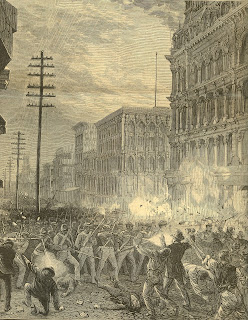The Curse of Prescience
Super Sad True Love Story by Gary Shteyngart Super Sad True Love Story offers a vision of the future that follows present day social, political and economic trends to their sardonically satirical dystopian conclusion. It is a novel that sets a star crossed romance against the backdrop of the decadent west in decline. The author, Gary Shteyngart, imagines his future dystopia literally rather than allegorically. This allows him to create characters that are more real than symbolic. But it also leads to some odd examples of a kind of warped literary prescience. The emergence of an Occupy Wall Street type movement in the imagined future of the novel is probably the most prominent example of this prescience. The book was published over a year before the tents started to go up at Zucotti Park, but the parallels between the rolling campsite protests that occur in the novel due to the U.S.'s continued economic problems bear an eerie resemblence to what transpired in reality not so ...

